Archive
30 March 2021
Novel disaster communication system empowers communities and can save lives
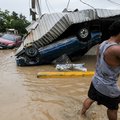
Een bijna lege telefoon kan bij rampen het verschil betekenen tussen leven en dood. TU Delft onderzoeker Indushree Banerjee heeft daarom een nieuw energie-efficiënt en betrouwbaar noodcommunicatiesysteem ontworpen voor smartphones. Het systeem maximaliseert het aantal mensen dat gedurende een langere periode kan communiceren en kan daarmee levens redden in getroffen gebieden.
29 March 2021
Clever Delft trick enables 20 times faster imaging with electron microscopy

Researchers at TU Delft have expanded upon a clever trick that increases the speed of electron microscope imaging by a factor of twenty. A simple adjustment is all that is needed: applying a voltage to the specimen holder. Through this simple intervention, a specimen that the electron microscope would normally take a week to image can now be inspected in a single night or one working day.
26 March 2021
TU Delft builds supercomputer on own campus

TU Delft is building the Delft High-Performance Computing Centre (DHPC). This supercomputer complements existing national and cloud-based facilities, and offers academics and students greater flexibility when conducting their research. The arrival of the supercomputer is accompanied by a comprehensive training programme addressing the effective use of computing facilities.
26 March 2021
TU Delft maps out airflow in Thialf stadium

The ventilation system in the Thialf ice stadium creates an airflow that affects the skaters. This is the conclusion of TU Delft aerodynamics researcher Alexander Spoelstra. He was commissioned by Thialf to closely map out the airflow, after skaters asked questions about the stadium's ventilation system. Spoelstra used a research set-up made up of lasers, helium bubbles and high-speed cameras. The technical report of the investigation was published online on 26 March.
26 March 2021
Researchers shed new light on DNA replication
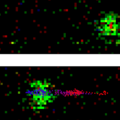
In preparation for cell division, cells need to copy (‘replicate’) the DNA that they contain. A team of researchers from TU Delft, collaborating with investigators from the Francis Crick Institute in London, has now shown that the protein building blocks involved in the initial steps of DNA replication are mobile but reduce their speed at specific DNA sequences on the genome. Their findings, which will be published on 26 March in the open-access journal Nature Communications, were facilitated using an integrated approach involving biophysics and biochemistry that will propel new discoveries in the field.
24 March 2021
Semiconductor qubits scale in two dimensions
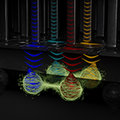
The heart of any computer, its central processing unit, is built using semiconductor technology, which is capable of putting billions of transistors onto a single chip. Now, researchers from the group of Menno Veldhorst at QuTech, a collaboration between TU Delft and TNO, have shown that this technology can be used to build a two-dimensional array of qubits to function as a quantum processor. Their work, a crucial milestone for scalable quantum technology, was published today in Nature.
10 March 2021
TU Delft and partners to create superhighway for digital data
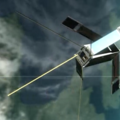
TU Delft researchers and 20 partners will develop reliable and safe wireless broadband connections using light instead of radio waves. They anticipate that this technology will allow us to securely send and process digital data at high speeds, with low latency. For this research project, the team has been awarded €4.1 million from the Dutch Research Council’s (NWO) Perspectief programme. TU Delft is also participating in the other five consortia that received Perspectief funding.
08 March 2021
Retraction Nature article Quantized Majorana conductance
The authors of the 2018 article Quantized Majorana conductance have retracted this article. The authors were alerted to problems by two scientists in the same research area and then went on to re-examine their earlier measurements. In doing so, they found that the main conclusion had not been adequately substantiated.
08 March 2021
New test makes detection of genetic material visible to the naked eye
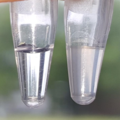
Onderzoekers van de TU Delft hebben een test ontwikkeld waarmee ze specifieke stukjes genetisch materiaal kunnen opsporen, waarna de uitslag met het blote oog af te lezen is. Met de test kunnen onder meer virussen, zoals het coronavirus, en antibioticaresistente bacteriën snel en goedkoop worden gedetecteerd. De resultaten zijn gepubliceerd in Biophysical Journal.
08 March 2021
Corona proof dining out with online tool

Scientists of Wageningen University & Research, TU Delft and Erasmus MC have developed an online tool that helps determine how indoor spaces can be designed and used corona proof. With the OpenSmartTogether tool, restaurant owners can limit the risks of the spreading of the coronavirus in their restaurant. The researchers are inviting restaurant owners to participate in an online pilot.
05 March 2021
TU Delft launches Tech for Health
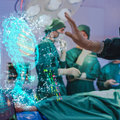
Today, TU Delft launches Tech for Health | Better healthcare thanks to Delft technology. The university is shining a spotlight on its research innovations that contribute to the improvement of healthcare, especially in countries like The Netherlands.
04 March 2021
TU Delft maintains its 15th position in global QS Subject ranking

Just like last year, the World University Rankings by Subjects 2021, published on 3 March, places TU Delft in a respectable 15th position in the broad category Engineering & Technology. Ten disciplines, including Architecture, Civil & Structural Engineering, Mechanical, Aeronautical & Manufacturing Engineering and Environmental Sciences, are ranked in the global top 20.
03 March 2021
Researchers invite all inhabitants of the Netherlands to contribute to climate policy
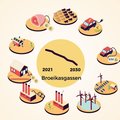
What does the Dutch population think about Dutch climate policy? Researchers from TU Delft and Utrecht University invite thousands of Dutch people to contribute their ideas.
02 March 2021
TU Delft maps own CO2 emissions in detail
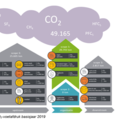
As a ‘climate university’, TU Delft aims to be carbon neutral and circular by 2030. Information regarding CO2 emissions on campus is essential to realising this ambition. The CO2 performance ladder methodology has now been used to map emissions in 2019.
02 March 2021
Measuring system using laser beams and helium bubbles helps top skaters go for gold
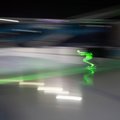
TU Delft, NOC*NSF, KNSB and Innovation Lab Thialf have been using the Ring of Fire measuring system to analyse top Dutch speed skaters. The measuring system was used last week in Heerenveen to measure and visualise the air resistance around a moving skater.
26 February 2021
TU Delft increasing study spaces on campus
Studying online places a heavy burden on students. Therefore, TU Delft is looking at various possibilities to enable more physical education and study places on campus. “We realise that for some students it is very difficult to study at home. That is why we are looking at increasing the number of study places on campus” says Rob Mudde, Vice President of Education TU Delft.
22 February 2021
Climate Action Election Debate Thursday 4 March 2021
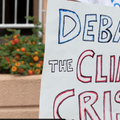
On 4 March, Studium Generale, in collaboration with GreenTU and the Student Council, is organising the Climate Action Election Debate 2021, with representatives of the political youth parties. During this evening we give the generation that will shape the near future a platform to debate their solution for the climate problem. https://sg.tudelft.nl/event/climate-action-verkiezingsdebat-2021/
10 February 2021
5.7 million euro for hybrid energy storage systems
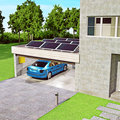
The Dutch Ministry of Economic Affairs and Climate Policy has allocated 5.7 million euro to FLEXINet. In the upcoming years, the FLEXINet consortium will develop hybrid energy storage systems – capable of storing both heat and electricity. Pavol Bauer, professor at TU Delft and project leader and coordinator: ‘The aim of FLEXINet is a system that accelerates the energy transition. We hope to make a substantial contribution to reaching climate targets by cleverly combining various techniques – think of blending recycled batteries with flexible heat pumps and the charging of electric cars.’
01 February 2021
TU Delft and ASML map non-visible materials at nanoscale with ultrasound
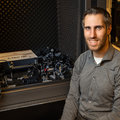
The increasing miniaturisation of electrical components in industry requires a new imaging technique at the nanometre scale. Delft researcher Gerard Verbiest and ASML have developed a first proof-of-concept method that they now plan to further develop.
01 February 2021
Aerosol particles cool the climate less than we thought
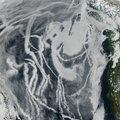
De invloed van aerosolen in de atmosfeer op wolken en het klimaat is mogelijk anders dan eerder werd gedacht, concludeert wolkenonderzoeker Franziska Glassmeier.
01 February 2021
TU Delft develops 'brains' for buildings

A large consortium led by TU Delft is going to provide ‘brains’ to buildings. The Dutch Minis-try of Economic Affairs and Climate Policy has allocated 6.9 million euro to the Brains 4 Build-ings project. The objective of the project is to contribute to the development of smart meth-ods and algorithms that add operational intelligence to buildings, in order to make them as energy efficient and comfortable as possible. Professor and scientific coordinator Laure Itard: “Buildings’ energy systems have become so complex that their real time control cannot be achieved by traditional methods. We need much clever approaches using the potential of machine learning and artificial intelligence.”
28 January 2021
Pandemic & Disaster Preparedness Center: facing future disasters well prepared
In today’s edition of the TV show Jinek, Ernst Kuijpers, Marion Koopmans and Ahmed Aboutaleb presented plans for the Pandemic & Disaster Preparedness Center (PDPC) developed by the convergence collaboration between TU Delft, Erasmus University Medical Center (Erasmus MC) and Erasmus University Rotterdam. In this centre, Rotterdam and Delft bring together top scientists in the fields of medicine, engineering (including AI), logistics and sociology. Their ambitious research agenda addresses the extent and the interrelated aspects of future pandemics and disasters. In the Netherlands and around the world, there is an urgent need to better prepare for pandemics and disasters such as the current coronavirus crisis. The knowledge that has been acquired in the Rotterdam area can be applied broadly, which means that the Pandemic & Disaster Preparedness Center will be able to play an important role worldwide in preparing for future disasters and pandemics.
28 January 2021
TU Delft launches new series of TU Delft AI Labs

TU Delft is launching a new series of eight TU Delft AI Labs today. In these labs, scientists are using artificial intelligence (AI) to accelerate scientific progress and help solve societal issues. Another eight labs will be launched later in 2021, bringing the total to 24. In the past year, almost all sixteen of the new Assistant Professor posts opened as part of this programme thus far have been filled. The recruitment of 32 PhD students for the new TU Delft AI Labs will start end of February. In addition, TU Delft will present the labs at the MIT European career fair on 25 February.
20 January 2021
Paulien Herder appointed Dean Faculty of Applied Sciences (AS)

19 January 2021
Appreciating a flower’s texture, color, and shape leads to better drone landings
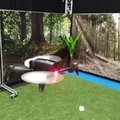
You may have wondered how a honeybee has such perfect navigation skills.
11 January 2021
Delft researchers build artificial chromosome
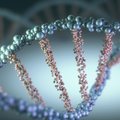
Biotechnologists at Delft University of Technology have built an artificial chromosome in yeast. The chromosome can exist alongside the natural yeast chromosomes, and serves as a platform to safely and easily add new functions to the micro-organism. Researchers can use the artificial chromosome to convert yeast cells into living factories capable of producing useful chemicals and even medicines.
11 January 2021
Consortium develops stress test for Port of Rotterdam energy transition investment plans: GridMaster

What is the future of the market for natural gas, hydrogen and electricity? A large consortium is working on an adaptive simulation model of the energy system of the port of Rotterdam.
07 January 2021
Andy van den Dobbelsteen appointed Sustainability Coordinator

The Executive Board has appointed Professor Andy van den Dobbelsteen as TU Delft Sustainability Coordinator with effect from 1 January 2021.
21 December 2020
TU Delft physics student makes world’s smallest Christmas tree
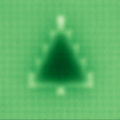
Every year, people all over the world try to make the biggest artificial Christmas tree. Like the Gubbio Christmas Tree, formed by thousands of lights on the slopes of Mount Ingino. Or the illumination of the 372-metre high transmission mast at Lopik in The Netherlands. Maura Willems, a student of Applied Physics at Delft University of Technology (TU Delft), decided to do the opposite. She created what is probably the world’s smallest Christmas tree.
17 December 2020
The Dutch are in favour of the introduction of a vaccination certificate as a reward

For us to be able to get Covid-19 under control, approximately 70% of the Dutch population would need to be vaccinated. There is considerable support among the Dutch population for the introduction of a vaccination certificate to encourage people to have themselves vaccinated. A vaccination certificate would offer people who have been vaccinated more freedom, for example to keep up their usual activities during an outbreak or to attend events at which maintaining a distance of 1.5m between people is not possible. This has become apparent from representative research among 1,640 Dutch people that was conducted by researchers from TU Delft, Erasmus University Rotterdam, RIVM, Maastricht University and Roskilde University.
17 December 2020
Delft researchers chart the potential risks of 'free-floating DNA'

We don’t realize it, but loose strands of DNA end up in nature via our wastewater. As of yet, it is unclear how much this 'free-floating DNA' impacts environmental and public health. Researchers at Delft University of Technology (TU Delft) have now found a way to determine just how much potentially harmful DNA ends up in our wastewater. They have developed a method that can isolate such ‘free floating DNA’ from wastewater, which gives them the means to determine the extent of the problem. The results of their work will officially be printed in Water Research in February 2021, but have already been pre-published online.
09 December 2020
Existing neighbourhoods energy-neutral thanks to innovative solar heat network
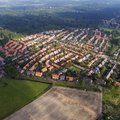
A solar heat network has proven to be technically and financially feasible for making existing neighbourhoods more sustainable and natural gas-free, as demonstrated by a consortium led by TU Delft
09 December 2020
ERC Consolidator grants for TU Delft researchers
The ERC has awarded a Consolidator Grant to Stan Brouns, Kristof Cools and Simon Gröblacher from TU Delft. With this support, they will be able to consolidate their teams and have farreaching impact. It was the first ERC Consolidator Grant application process that was conducted completely online.
08 December 2020
2020 edX Prize for TU Delft online course on energy-neutral buildings
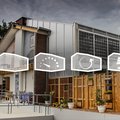
Andy van den Dobbelsteen, Eric van den Ham and Tess Blom (Faculty of Architecture and the Built Environment) are the winners of the 2020 edX Prize for Exceptional Contributions in Online Teaching and Learning, with their online course “Zero-Energy Design: an approach to make your building sustainable”. Their MOOC is designed to help participants figure out which energy measures can be applied to make their buildings (more) sustainable and zero-energy consuming.
07 December 2020
SURF Education Award for Willem van Valkenburg
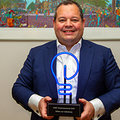
Willem van Valkenburg, Executive Director of the TU Delft Extension School received the SURF Education Award 2020 for his outstanding contribution to educational innovation nationally and internationally.
04 December 2020
Professor Ronald Hanson appointed Distinguished Professor in Quantum Computing and Quantum Internet
Professor Ronald Hanson of the Faculty of Applied Sciences (AS) and the QuTech Institute has been appointed Distinguished Professor in Quantum Computing and Quantum Internet.
03 December 2020
TU Delft appoints ‘Pro Vice-Rector’ of AI, Data and Digitalisation

The Executive Board of TU Delft has appointed Professor Geert-Jan Houben as Pro Vice-Rector Magnificus of Artificial Intelligence, Data and Digitalisation (PVR AI) with effect from 1 December 2020. In this role Houben will be leading the TU Delft AI Initiative and promoting regional, national and international co-operation on this theme.
02 December 2020
TU Delft software for determining contagion risk for specific locations
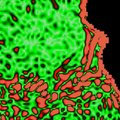
TU Delft professor of aerodynamics Fulvio Scarano, together with fluid mechanics expert Lorenzo Botto and simulation expert Wouter van den Bos, has developed software to calculate the risk of Covid-19 contagion at specific locations. The model virtually places a sick person in the space in question and simulates how quickly virus particles spread. The TU Delft researchers hope that designers will use the software to make predictions for determining whether an aircraft, classroom or restaurant, for example, is safe. The plug-in will probably become available in February.
01 December 2020
Delft researchers develop blood oxygenation sensor for premature babies

Doctors have to keep a close eye on babies that are born prematurely, and brain oxygenation is perhaps the most important thing to monitor. Up to 50 percent of premature babies suffer brain damage, leading to neurological problems. Researchers at Delft University of Technology have now developed a wireless sensor that monitors the health of the baby's brain in a simple, inexpensive and comfortable way for the child.
01 December 2020
Researchers peer deep inside tissue
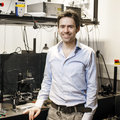
One of the challenges in optical imaging is imaging the inside of tissue in high resolution. Traditional methods allow us to look to a depth of approximately one millimetre. Researchers at Delft University of Technology have now developed a new method that can penetrate up to four times as deep: up to around four millimetres. The healthcare sector in particular may benefit from the new technique in the future.